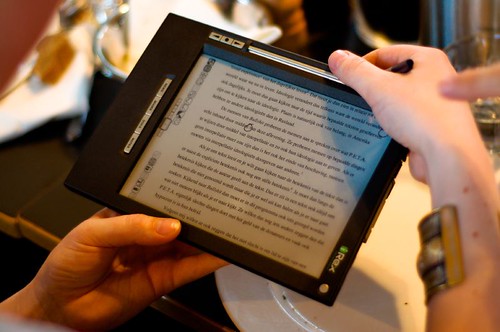
I’ve been thinking about buying an e-book lately. I recently moved houses and, boy, books are heavy! I haven’t bought one yet because none of the available e-books currently meet my criteria:
- Fast: no flickering when turning pages
- Editable: make notes with qwerty keyboard or touchscreen writing: as a teacher this is a must have!
- Export as pdf: as a teacher this is a must have!
- Import pdf without converting into a proprietary format.
- Access to e-bookstores outside of the USA. I cannot order books on Amazon as a Dutch resident.
- A strong wish, not a must: wireless/bluetooth connection.
A few weeks ago, at the Lifehacking Academy Amsterdam, I briefly saw and tried the Amazon Kindle 1 (slow, sluggish page-turning, horrible interface) and the Sony Reader (pretty decent interface but low editing capabilities). Two years ago I tried the iRex iLiad reader (a new version has since come out) which currently still seems to have the best editing capabilities compared to the Amazon Kindle and the Sony Reader. The main difference between the iLiad, Kindle and Sony Reader is the price. The iLiad is rather expensive at 599 euro compared to the other two which are around 350-400 dollars.
What recently sparked my interest in buying an e-book is Steven Johnson’s article in the Wall Street Journal: ‘How the E-Book Will Change the Way We Read and Write.’ In the article he points to the medium specificity of the e-book, connecting it to the web. Johnson describes the fragmentation of text that might occur, just as happened to ‘albums’ with the introduction of buying ‘songs’ in the iTunes store. The web seems to be a medium that favors fragmentation: from the webpage to the blogpost and from the album to the song. Will we be able to buy chapters or a few paragraphs?
Johnson describes a new phenomenon which he calls ‘booklogs’ as a new way of publishing and sharing your commentary on paragrahs, chapters or whole books. Books have ISBN numbers which could serve as a the basis for a new kind of permalink, although the fragmented parts of book would require a new way of referring.
One of the most intriguing parts of the article is the part titled ‘Writing for Google’ in which Johnson describes how the e-book is entangled in web relations with search engines:
Writers and publishers will begin to think about how individual pages or chapters might rank in Google’s results, crafting sections explicitly in the hopes that they will draw in that steady stream of search visitors. […] Perhaps entire books written with search engines in mind. (Johnson, 2009)
This reflects my thoughts about bloggers writing for Google which I described in detail in ‘Blogging for Engines.’ Through a tight integration of web services the e-book could become a platform. Frank Meeuwsen imagined using e-books in hospitals as a medical resource and annotation tool.
Of course the final question is: to buy or not to buy an e-book? Currently priced at 359 dollars the Kindle 2 seems a reasonable price, especially since I’ll be in the US again soon. Any thoughts?

I’m seriously thinking of getting myself a Kindle too… the Amazon database is really great! I’m still very disappointed with Amazon though – for not selling the Kindle outside the US. How cool if you DO live in the US and get all your content wirelessly- also newspapers, RSS and blogs.
My thoughts exactly. I might get a Kindle this summer while I am in the US and fill it with enough content to read till eternity. But on a serious note, I’d love to read my blog subscriptions on a Kindle. Heck, I might even subscribe to a newspaper again!
There is room in the world for another way to enjoy written narative.
http://www.publishersweekly.com/article/CA6574045.html
And Kindle is most far away from being a prototype.
You have a peculiar use of the word ‘e-book’. While most people would call the file or the abstract format an e-book, you also use it to refer to the device, that most would call and e-book reader or e-reader. It’s like calling your iPod an ‘mp3’.
I currently have an iLiad iRex via my work, but I would not buy one myself. You forgot to mention one important flaw of I think all e-readers, namely that they break like crazy. Half of the iLiads we ordered for our projects two years ago are broken. I heard @vincente had similar issues with his Kindle. The technique is very sensitive, and I would not risk paying such an amount of money for something that might only last a month.
By the way, if you’re interested in this topic, try to look out for the MePaper project. It’s a project we did with several Dutch newspapers about publishing news and e-readers (iLiads) and netbooks. The final reports should be published within 1 or 2 months. It won’t be too positive on the iLiad though.
Thanks for your comment, you are absolutely right, I got the terms mixed up.
I wasn’t aware of the problems with e-readers breaking easily. Thanks for the tip about the MePaper project.
Are you going to PRINT/PIXEL, an international conference on the shifting relation between electronic and paper publishing, Tuesday & Wednesday 12-13 May 2009? I hope to be able to attend the Tuesday.
Oh, Print/Pixel sounds really interesting! I’m starting a new job on Monday so I don’t know if it will fit into my schedule unfortunately.